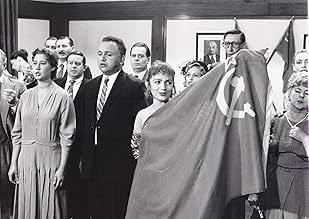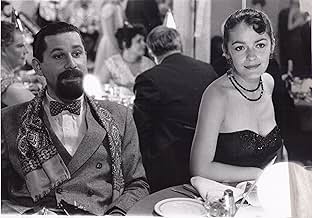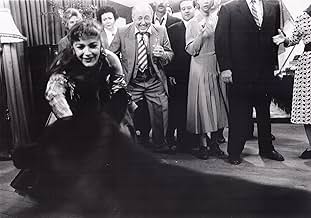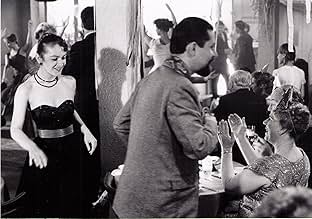Aggiungi una trama nella tua linguaThe defection of Soviet diplomat Vladimir Petrov in Canberra in 1954.The defection of Soviet diplomat Vladimir Petrov in Canberra in 1954.The defection of Soviet diplomat Vladimir Petrov in Canberra in 1954.
Sfoglia gli episodi
Trama
Recensione in evidenza
Australia produced a string of classic mini-series in the 1980s. "Bangkok Hilton", "Bodyline", "Harp In The South", "Nancy Wake" and "Vietnam" all come to mind. "The Petrov Affair" doesn't match up to any of the above mentioned titles but it's not a complete write off either.
This film examines the events surrounding Vladimir Petrov's application for political asylum in Australia in the 1950s. Petrov was a Soviet spy who was posted to Canberra with his wife, Evdokia. When Stalin died, Petrov and his wife fell out of favour with Moscow and they were ordered to return home by the new Ambassador. Petrov, fearing the reception he would receive, decided to defect and on ASIO's demand, brought along a stash of secret documents. The contents of these documents resulted in an infamous royal commission and for all intents and purposes, influenced an electoral result.
"The Petrov Affair" really bites off more than it can chew. The film tries to cover too much and the end result feels hurried and incohesive. Some of the acting leaves a lot to be desired, with some hilariously bad Russian accents on display. Luckily, the filmmakers had the good sense to use the Russian born actor, Alex Menglet for Petrov. I thought his performance was quite convincing. Eva Sitta does reasonably well as Evdokia Petrov, but is hampered by a poor script which reduces her role to being a whiny communist housewife.
By far the most interesting scenes involve Evdokia's "rescue" from KGB agents at Darwin airport and the steady deterioration of the Petrov's marriage. The scenes involving political intrigue, however, are contrived and utterly boring. I would really only recommend this film to people who are interested in the events upon which it is based. Everyone else will find it difficult to muster enough enthusiasm to sit through the film's 180 minutes.
This film examines the events surrounding Vladimir Petrov's application for political asylum in Australia in the 1950s. Petrov was a Soviet spy who was posted to Canberra with his wife, Evdokia. When Stalin died, Petrov and his wife fell out of favour with Moscow and they were ordered to return home by the new Ambassador. Petrov, fearing the reception he would receive, decided to defect and on ASIO's demand, brought along a stash of secret documents. The contents of these documents resulted in an infamous royal commission and for all intents and purposes, influenced an electoral result.
"The Petrov Affair" really bites off more than it can chew. The film tries to cover too much and the end result feels hurried and incohesive. Some of the acting leaves a lot to be desired, with some hilariously bad Russian accents on display. Luckily, the filmmakers had the good sense to use the Russian born actor, Alex Menglet for Petrov. I thought his performance was quite convincing. Eva Sitta does reasonably well as Evdokia Petrov, but is hampered by a poor script which reduces her role to being a whiny communist housewife.
By far the most interesting scenes involve Evdokia's "rescue" from KGB agents at Darwin airport and the steady deterioration of the Petrov's marriage. The scenes involving political intrigue, however, are contrived and utterly boring. I would really only recommend this film to people who are interested in the events upon which it is based. Everyone else will find it difficult to muster enough enthusiasm to sit through the film's 180 minutes.
- Crap_Connoisseur
- 21 dic 2005
- Permalink
I più visti
Accedi per valutare e creare un elenco di titoli salvati per ottenere consigli personalizzati
Dettagli
- Tempo di esecuzione2 ore
- Colore
Contribuisci a questa pagina
Suggerisci una modifica o aggiungi i contenuti mancanti

Divario superiore
By what name was The Petrov Affair (1987) officially released in Canada in English?
Rispondi













